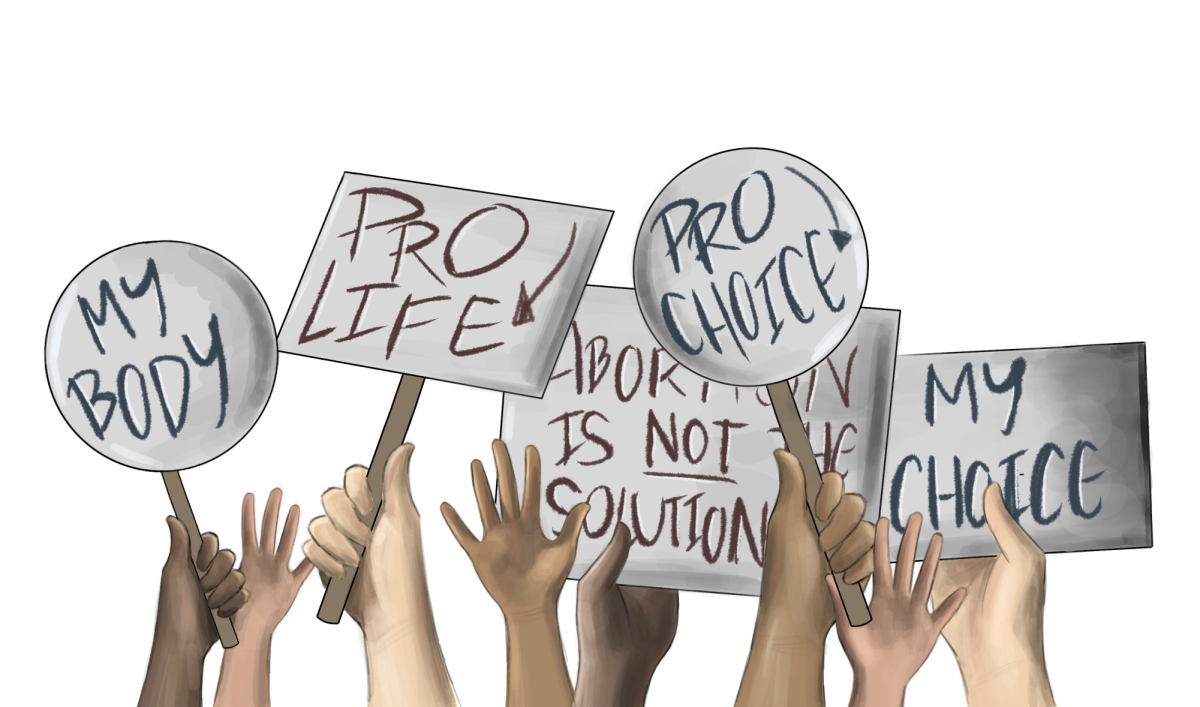TRUTH MATTERS… Donate to support excellence in student journalism
“A fetus is a living being, and abortion is murder!” passionately shouts pro-life protesters on one side of a crowded street.
Without missing a beat, their pro-choice counterparts on the other side reply, “Abortion is a medical procedure that every woman deserves the right to receive should they see it fit!”
The question of the morality of an abortion and a woman’s right to obtain one has fostered a growing divide amongst citizens in the United States for decades, a divide that became all the more noticeable after the overturn of Roe v. Wade in 2022.
The decision stated that the Constitution does not protect the right to an abortion, thus leaving the legality of abortion up to each state.
To many, including Senior Helena Razi, the ruling seemed like an obvious regression in women’s rights.
“If government officials are able to take one right away, then it makes them think that it is okay to take other rights away in the future,” Razi said.
Razi describes herself as 100% pro-choice and believes that the government has no right to decide what medical procedures a woman should have available to her.
“Every person should have the ability to do what they want with their own body,” Razi said. “There shouldn’t be lawmakers trying to make decisions on what a woman does or doesn’t do with herself.”
Yet this has not stopped state officials across the country from putting heavy restrictions on abortion. In the last two years, certain states, like California, have imposed heavy restrictions, while others, including Alabama and Louisiana have banned abortion entirely.
Sophomore Lizette Aguirre, who has a more conservative view on abortion, does not agree with complete bans. She believes that exceptions should always be made for cases where women have been raped, abused or are risking their lives carrying to full term.
“If a woman knowingly puts herself in a situation where she was aware she could get pregnant, then she should have to deal with the consequences that follow,” Aguirre said. “But a woman that has been abused should not be forced to carry a child that will remind her of that moment.”
In banned areas, patients as well as healthcare providers can face criminal charges for being involved in abortion procedures, with no exceptions for cases of rape or incest.
According to U.S. history teacher Mr. Douglas Kayne, the threat of criminal charges has struck fear in many healthcare providers.
“Since Roe v. Wade was overturned by the Supreme Court, we have already seen healthcare professionals and providers flat out refuse to administer healthcare to women out of fear that it will be seen as if they are participating in an illegal abortion, even if the fetus is no longer viable,” he said.
Strict bans and state healthcare providers’ refusal to administer an abortion have led women to cross state lines to receive care, as well as engage in telehealth abortions.
Through Telehealth Abortions, women can receive abortion medication through mail and remotely consult with a doctor over-call in another state to carry out the procedure in the comfort of her home.
This approach has been approved by the FDA and can legally be practiced in states where abortion is illegal due to “shield laws” that have been put in place that state a healthcare provider cannot be prosecuted by another state for helping a woman obtain an abortion over state lines.
According to the Society of Family Planning’s most recent #WeCountReport, an average of 6,700 monthly Telehealth Abortions were provided under shield laws in states that have strict abortion bans.
The #WeCountReport also stated that 2024 so far has experienced a higher abortion rate compared to 2022 and 2023.
Razi believes that the use of telehealth abortions and the increase of abortion rates throughout the United States showcase how state abortion bans do not benefit everyday American women or reflect their interests.
“This scenario represents how the overturn of Roe v. Wade was only supported by a minority, while a majority of women are fearful of their rights being stripped away and are doing everything in their power to access reproductive care,” Razi said.
Razi shared that she is afraid that the outcome of this year’s upcoming Presidential election could only have further consequences on women’s rights regarding abortion.
“If we put the wrong person in power we could see further infringement on our rights and thus a greater ban on abortion,” Razi said.
Mr. Kayne explained that voters should be careful of who they vote for if the issue of abortion is important to them.
“People should have power over their own bodies,” he said. “Any restrictions suggested or encouraged by a presidential candidate could have much deeper ramifications than just the decision of whether to terminate a pregnancy or not. I strongly recommend that everyone considers all of the ramifications of selecting a particular candidate, even if you disagree with their stance on abortion.”
The 2024 presidential candidates have notably different views on abortion and a woman’s right to obtain one.
Former President Donald Trump considered himself to be a pro-life president and currently says that abortion laws should be left to the states. But Trump has changed his stance on abortion a number of times.
Unlike Trump, Vice President Kamala Harris believes abortion should be legal across the country and strongly rejects efforts to restrict abortion in any way.
Reproductive rights play a key role in her overall campaign, and it could be women who support abortion rights that help elect her as the first female president.
On top of abortion being a prominent topic in the presidential election, multiple states will be including measures on abortion on their own ballots this year.
Arizona, Missouri, Nebraska, Montana and Florida are among these states which will be voting on measures that will either further restrict or protect access to abortions through an amendment in their state constitution.
Given the prominence of the discussion of abortion laws and rights throughout the country, students like Aguirre believe that voters should pay close attention to the issue.
“Abortion is one of the main issues in America, and your vote could have an effect on whether or not your own opinions are heard,” says Aguirre.
This article originally appeared in the Fall 2024 print edition.



